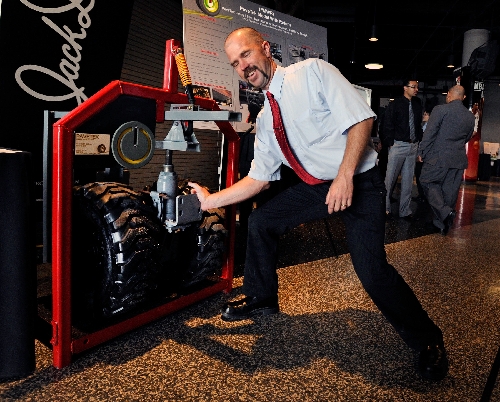UNLV engineering students’ projects delight, dazzle
Last summer, Philip Dupree got home and walked to his front door. It was intensely hot outside. His arms were full of groceries, and he didn't want to put them down.
He had a thought: What if the door would just unlock itself when he approached it?
For most people, that's about as far as it would have gone. A thought.
But Dupree isn't most people. He's an engineering student at UNLV.
So he and two other students, Mitchell Burton and Stephen McHargue, put themselves to work. They came up with the ProxyLok, which does exactly that: It unlocks your front door for you.
"Every year, these things get better and better," the university's president, Neal Smatresk, said after checking out ProxyLok's display at this year's Senior Design Competition.
Graduating seniors in the College of Engineering must design and build a project as part of their graduation requirements. But this isn't just a science fair.
The products have to be more than functional. They have to be commercially viable.
Last year, the college joined with the university's business college so the students' inventions wouldn't just sit there gathering dust after the competition. There would be actual business plans.
So far, several real businesses have resulted.
The students with ProxyLok hope they will be able to manufacture the thing and eventually retail it for $200 to $250. It'll fit onto an existing door without replacing anything.
Other projects included a solar-powered autoclave for sterilizing medical instruments in developing countries, a system to turn gasoline-powered cars into plug-in hybrids, and a solution to a potential traffic nightmare.
That last one is the one that Craig Cavileer happened to stop by and check out.
Cavileer is the real estate developer behind the UNLV Now project, the idea to build a massive domed sports stadium, retail businesses, parking structures and student housing on campus. If it's ever built, it could mean 10,000 cars coming to the university all at once and leaving all at once.
As it happens, that is the problem one group of civil engineering students set out to solve.
"All you need to do is convince us, and it's done," Cavileer joked with the students.
Their project analyzed traffic patterns and counts at intersections all around the university. They came up with two solutions:
■ Turn Swenson Street into a tunnel that would go under the university. That would cost about $76.8 million.
■ Widen Paradise Road, make it a two-way road, and reconnect it with Swenson on the other side of the stadium. Voila, $3.6 million.
Most of the 43 projects on display would go for a lot less than that. Some as low as 99 cents.
Seventeen of the projects were applications for smartphones.
"This was the year of the smart devices," said Evangelos Yfantis, a computer science professor at UNLV.
He noted that computers run almost everything these days, from cars to coffee makers. Writing an app for a phone takes thousands of lines of code. But every one that sells for 99 cents earns the author 75 cents. A couple of million of those, and you're rich.
Maybe that will happen for Ruth Betowski. She came up with an app that will tell you all about fish. She got tired of going to a restaurant and not having a clue about the fish that was on the menu.
"I always wind up getting the salmon," she said.
Her app, called Know Your Fish, is easily searchable and tells you stuff like how healthy it is, whether it'll make you sick, whether it's from a species susceptible to mercury contamination, that sort of thing.
There were all kinds of apps. There were apps for coupons, for keeping track of traffic, for learning Japanese, even for yoga.
But that's only the beginning, said Yfantis, the professor.
"Next year," he said, "is going to be even bigger."
Contact reporter Richard Lake at rlake@reviewjournal.com or 702-383-0307.
SENIOR DESIGN COMPETITION
■ Grand prize - "Retrofit Hybrid Solution"; Jeremy Feliciano, Derek Joiner, Richard Ryan
■ Civil 1st place - "Smells Like Money: Anaerobic Digestion"; Cory Dow, Steven Winfree, Myron Fikse, Steven Matti
■ Civil 2nd place - "Pavement With Return"; Jimmy Floyd, Sean Gann, Anthony Ramos, Ricky Zeedyk
■ Computer Science 1st place - "Basic Yoga"; Amrita Nikhil Amritphale
■ Computer Science 2nd place - "Vegacite"; Sassan M. Knight
■ Electrical 1st place - "Magnetron Automatic Frequency Control"; John Turner
■ Electrical 2nd place - "Climatic"; Miguel B. Murillo, Sergio Flores-Castro
■ Entertainment 1st place - "Boom Ease"; Alan Holton, Jeremy Knowles, Kelly Tsadiasi
■ Entertainment 2nd place - "Go DJ"; Emily Black, Miles Caporicci, Max Godges
■ Mechanical 1st place - "The Self-Stirring Stove"; Sally Bachman, Trevor Bergstrom, Robert Brown, Matthew Reyburn
■ Mechanical 2nd place - "SolaCon"; Jessica Christy, Justin Galli, Joshua Herrera, Vu Tran
■ Interdisciplinary - "Sequential Automated Manual Transmission"; Timothy Pratt, Soloman Wu, George Louie


















